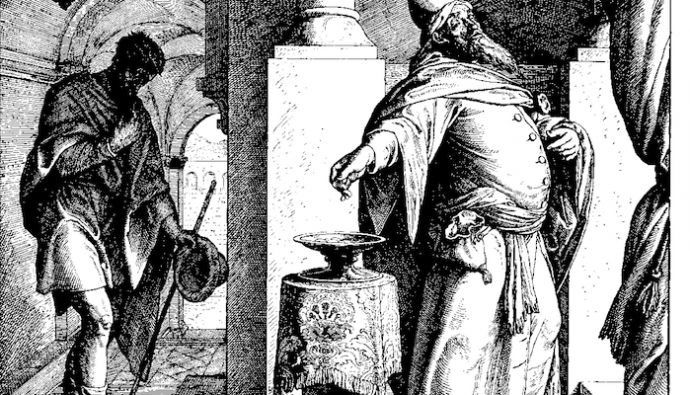We have, as humans, a remarkable propensity to turn that which is virtuous into that which is personally indicting. The very thing that might well be a mark of our pursuit of Jesus and growth in holiness can, at an astonishing speed, become a source of pride and therefore a hindrance to that spiritual growth:
- We volunteer to serve, and then immediately judge those who didn’t.
- We give some money, and then immediately look to see if someone noticed.
- We exercise self-control, and then immediately look to be rewarded by God for our efforts.
This tendency in my own heart – this tendency to corrupt – makes me think of a story Jesus told. But even more than the story, it makes me think of the way I react to the story. Perhaps you will remember this story the Lord told about two different people doing the same thing but for very different reasons:
“Two men went up to the temple to pray, one a Pharisee and the other a tax collector. The Pharisee was standing and praying like this about himself: ‘God, I thank you that I’m not like other people—greedy, unrighteous, adulterers, or even like this tax collector. I fast twice a week; I give a tenth of everything I get.’
“But the tax collector, standing far off, would not even raise his eyes to heaven but kept striking his chest and saying, ‘God, have mercy on me, a sinner!’ I tell you, this one went down to his house justified rather than the other; because everyone who exalts himself will be humbled, but the one who humbles himself will be exalted” (Luke 18:10-14).
The first man, filled with himself, spent his time thanking God that he was not like all those other people – the greedy, the sinners, the adulterers – pretty much everyone else. He thanked God for this, though we are left wondering if God was his true audience.
Standing next to him was one of those other people. He didn’t raise his eyes toward heaven, but instead had a true assessment of himself. His prayer was far less articulate: “Have mercy on me. Turn your wrath from me—a sinner!” He was one of those people, and he knew it.
Jesus followed up His story with the punch: “I tell you, this one went down to his house justified rather than the other; because everyone who exalts himself will be humbled, but the one who humbles himself will be exalted” (Luke 18:14).
To put it another way, humility is not an option. Every mouth will eventually be closed; every chest will eventually be beaten; every knee will eventually bow. Humble yourself now or be humbled by God later, but humility is coming nonetheless.
Now here’s the thing – we can look at this story and learn many things. We can learn, for example, that the fashion and nature of our prayers goes a great way in being a window to our hearts. We can see our true desires, our true belief in who God is and what He does, and our true assessment of ourselves by looking at our prayers. These are all virtuous things – they are the kinds of things that show we are moving forward with Jesus, being transformed into His likeness.
But here comes that tendency – that tendency to take what is good and corrupt it. I look at this passage and judge the Pharisee.
Do you see the irony? The Pharisee in the story thanked God that he was not like the tax collector. I read this parable and immediately thank God that I am not like the Pharisee. The virtue is corrupted; the good is undone.
Unless, that is, we recognize this tendency in ourselves. We see that what is meant to create humility in us is creating pride. We acknowledge the lurking sin in our hearts. And when we do that, the real good news starts to hit home, because even (and most especially) for the likes of people like us, those who can twist the good around for our own prideful ends, there is grace.
And in another twist of irony, it’s when we recognize that trait in ourselves that we can truly own the lesson of Jesus’ story. It’s only when we see this characteristic about ourselves that we can finally, at long last, take up the posture and the cry of the second man in the story, and along with him, cry out: “Have mercy on me, God, a sinner before you.”
Subscribe to MichaelKelley.co
Never miss a new post. Subscribe to receive these posts in your inbox and to receive information about new discipleship resources.




2 Comments